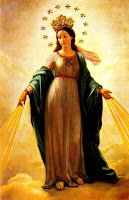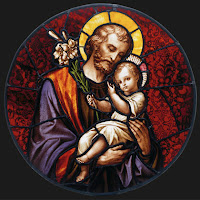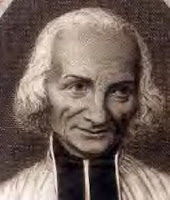“The shepherds went in haste to Bethlehem.”
Last Christmas night, the Holy Father gave a very beautiful meditation on the shepherds’ haste.
“What had been announced to them was so important that they had to go immediately. In fact, what had been said to them was utterly out of the ordinary. It changed the world. The Savior is born. The long-awaited Son of David has come into the world in his own city. What could be more important? No doubt they were partly driven by curiosity, but first and foremost it was their excitement at the wonderful news that had been conveyed to them, of all people, to the little ones, to the seemingly unimportant. They made haste – they went at once. In our daily life, it is not like that. For most people, the things of God are not given priority, they do not impose themselves on us directly. And so the great majority of us tend to postpone them. First we do what seems urgent here and now. In the list of priorities God is often more or less at the end. We can always deal with that later, we tend to think. The Gospel tells us: God is the highest priority. If anything in our life deserves haste without delay, then, it is God’s work alone. The Rule of Saint Benedict contains this teaching: ‘Place nothing at all before the work of God (i.e. the divine office)’. For monks, the Liturgy is the first priority. Everything else comes later. In its essence, though, this saying applies to everyone. God is important, by far the most important thing in our lives. The shepherds teach us this priority. From them we should learn not to be crushed by all the pressing matters in our daily lives. From them we should learn the inner freedom to put other tasks in second place – however important they may be – so as to make our way towards God, to allow him into our lives and into our time. Time given to God and, in his name, to our neighbor is never time lost. It is the time when we are most truly alive, when we live our humanity to the full.”
“…the shepherds, the simple souls, were the first to come to Jesus in the manger and to encounter the Redeemer of the world. The wise men from the East, representing those with social standing and fame, arrived much later. The commentators go on to say: this is quite natural. The shepherds lived nearby. They only needed to ‘come over’ (cf. Lk 2:15), as we do when we go to visit our neighbors. The wise men, however, lived far away. They had to undertake a long and arduous journey in order to arrive in Bethlehem. And they needed guidance and direction. Today too there are simple and lowly souls who live very close to the Lord. They are, so to speak, his neighbors and they can easily go to see him. But most of us in the world today live far from Jesus Christ, the incarnate God who came to dwell amongst us. We live our lives by philosophies, amid worldly affairs and occupations that totally absorb us and are a great distance from the manger. In all kinds of ways, God has to prod us and reach out to us again and again, so that we can manage to escape from the muddle of our thoughts and activities and discover the way that leads to him. But a path exists for all of us. The Lord provides everyone with tailor-made signals. He calls each one of us, so that we too can say: “Come on, ‘let us go over’ to Bethlehem – to the God who has come to meet us. Yes indeed, God has set out towards us. Left to ourselves we could not reach him. The path is too much for our strength. But God has come down. He comes towards us. He has traveled the longer part of the journey. Now he invites us: come and see how much I love you. Come and see that I am here. Transeamus usque Bethlehem, the Latin Bible says. Let us go there! Let us surpass ourselves! Let us journey towards God in all sorts of ways: along our interior path towards him, but also along very concrete paths – the Liturgy of the Church, the service of our neighbor, in whom Christ awaits us.”
“…the shepherds, the simple souls, were the first to come to Jesus in the manger and to encounter the Redeemer of the world. The wise men from the East, representing those with social standing and fame, arrived much later. The commentators go on to say: this is quite natural. The shepherds lived nearby. They only needed to ‘come over’ (cf. Lk 2:15), as we do when we go to visit our neighbors. The wise men, however, lived far away. They had to undertake a long and arduous journey in order to arrive in Bethlehem. And they needed guidance and direction. Today too there are simple and lowly souls who live very close to the Lord. They are, so to speak, his neighbors and they can easily go to see him. But most of us in the world today live far from Jesus Christ, the incarnate God who came to dwell amongst us. We live our lives by philosophies, amid worldly affairs and occupations that totally absorb us and are a great distance from the manger. In all kinds of ways, God has to prod us and reach out to us again and again, so that we can manage to escape from the muddle of our thoughts and activities and discover the way that leads to him. But a path exists for all of us. The Lord provides everyone with tailor-made signals. He calls each one of us, so that we too can say: “Come on, ‘let us go over’ to Bethlehem – to the God who has come to meet us. Yes indeed, God has set out towards us. Left to ourselves we could not reach him. The path is too much for our strength. But God has come down. He comes towards us. He has traveled the longer part of the journey. Now he invites us: come and see how much I love you. Come and see that I am here. Transeamus usque Bethlehem, the Latin Bible says. Let us go there! Let us surpass ourselves! Let us journey towards God in all sorts of ways: along our interior path towards him, but also along very concrete paths – the Liturgy of the Church, the service of our neighbor, in whom Christ awaits us.”






%2520(1634).jpg)












